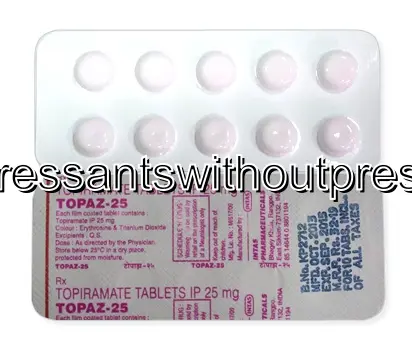| Package | Dosage | Price | Price per Dose | |
|---|---|---|---|---|
| Dosage: 25mg | ||||
| 360 pill | 25mg | AUD642.62 | AUD1.79 | |
| 180 pill | 25mg | AUD338.21 | AUD1.88 | |
| 120 pill | 25mg | AUD231.91 | AUD1.93 | |
| 90 pill | 25mg | AUD183.59 | AUD2.03 | |
| 60 pill | 25mg | AUD128.02 | AUD2.15 | |
| 30 pill | 25mg | AUD70.04 | AUD2.37 | |
| Dosage: 50mg | ||||
| 360 pill | 50mg | AUD1,034.00 | AUD2.87 | |
| 240 pill | 50mg | AUD719.93 | AUD3.00 | |
| 180 pill | 50mg | AUD543.56 | AUD3.02 | |
| 120 pill | 50mg | AUD364.78 | AUD3.04 | |
| 90 pill | 50mg | AUD289.89 | AUD3.21 | |
| 60 pill | 50mg | AUD200.50 | AUD3.36 | |
| 30 pill | 50mg | AUD108.69 | AUD3.60 | |
| Dosage: 100mg | ||||
| 240 pill | 100mg | AUD961.52 | AUD4.01 | |
| 180 pill | 100mg | AUD751.34 | AUD4.18 | |
| 120 pill | 100mg | AUD570.14 | AUD4.76 | |
| 90 pill | 100mg | AUD456.59 | AUD5.07 | |
| 60 pill | 100mg | AUD330.96 | AUD5.53 | |
| 30 pill | 100mg | AUD193.25 | AUD6.45 | |

Topiramate Description
Introduction to Topiramate
Topiramate is a medication commonly prescribed for the management of various neurological and psychiatric conditions. It was initially developed to treat epilepsy but has since found applications in preventing migraines and addressing other off-label uses. As an anti-epileptic drug, Topiramate works by modulating electrical activity in the brain, helping to reduce the frequency and severity of seizures. Its versatility makes it a popular choice among healthcare providers for patients needing comprehensive neurological care.
Mechanism of Action
The exact mechanism by which Topiramate exerts its effects is complex but involves multiple pathways. It enhances the activity of gamma-aminobutyric acid (GABA), an inhibitory neurotransmitter that calms neural activity. Simultaneously, it inhibits certain ion channels and neurotransmitter receptors that promote excitability. These combined actions help stabilize neuronal activity, which can prevent seizures and reduce headache episodes. This broad spectrum of activity contributes to its effectiveness across different conditions related to abnormal brain activity.
Benefits and Effectiveness
Patients often report a significant reduction in symptom frequency when taking Topiramate. For individuals with epilepsy, it can effectively decrease the number of seizures, providing better quality of life. Those suffering from migraines often find relief from the intensity and occurrence of their headaches. Many users also note improvements in mood and cognitive function, although these effects can vary. The medication’s ability to target multiple pathways makes it a versatile choice, but it requires careful management to optimize benefits and minimize side effects.
Possible Side Effects
Like all medications, Topiramate can cause side effects. Some common issues include drowsiness, dizziness, and dizziness, which might impair daily activities. Others may experience cognitive disturbances such as difficulty concentrating or confusion. Weight loss and altered appetite can also occur, which might be beneficial or problematic depending on the individual’s health needs. Less frequently, patients report tingling sensations or numbness in extremities. Serious side effects are rare but can include kidney stones, metabolic acidosis, or vision problems. It is important to discuss any unusual symptoms with a healthcare provider promptly.
Precautions and Considerations
Patients considering Topiramate should have a thorough medical evaluation. Those with a history of kidney stones, glaucoma, or metabolic issues should inform their doctor before starting therapy. Because of its effects on cognition and alertness, caution is advised when performing tasks that require full attention. Pregnancy category D indicates potential risks to the unborn, so women planning to conceive should consult their healthcare provider about safety. Regular monitoring of kidney function and other parameters is recommended during treatment to ensure safety and efficacy.
Usage Guidelines
Topiramate is usually prescribed in a gradual dosage increase to minimize side effects and improve tolerability. It is typically taken once or twice daily with or without food. Adherence to the prescribed schedule is crucial for optimal results. Patients should not stop taking the medication abruptly, as this can cause withdrawal seizures. Follow-up appointments are essential to assess effectiveness and adjust dosage if necessary. Combining Topiramate with other medications should be managed carefully to avoid adverse interactions.
Conclusion
Overall, Topiramate is a potent medication with a broad spectrum of applications in neurological and migraine treatment. Its ability to stabilize abnormal brain activity makes it effective for many patients. However, like all drugs, it requires careful monitoring for side effects and interactions. When used responsibly under medical supervision, Topiramate can significantly improve the quality of life for those managing epilepsy, migraines, or related conditions.
